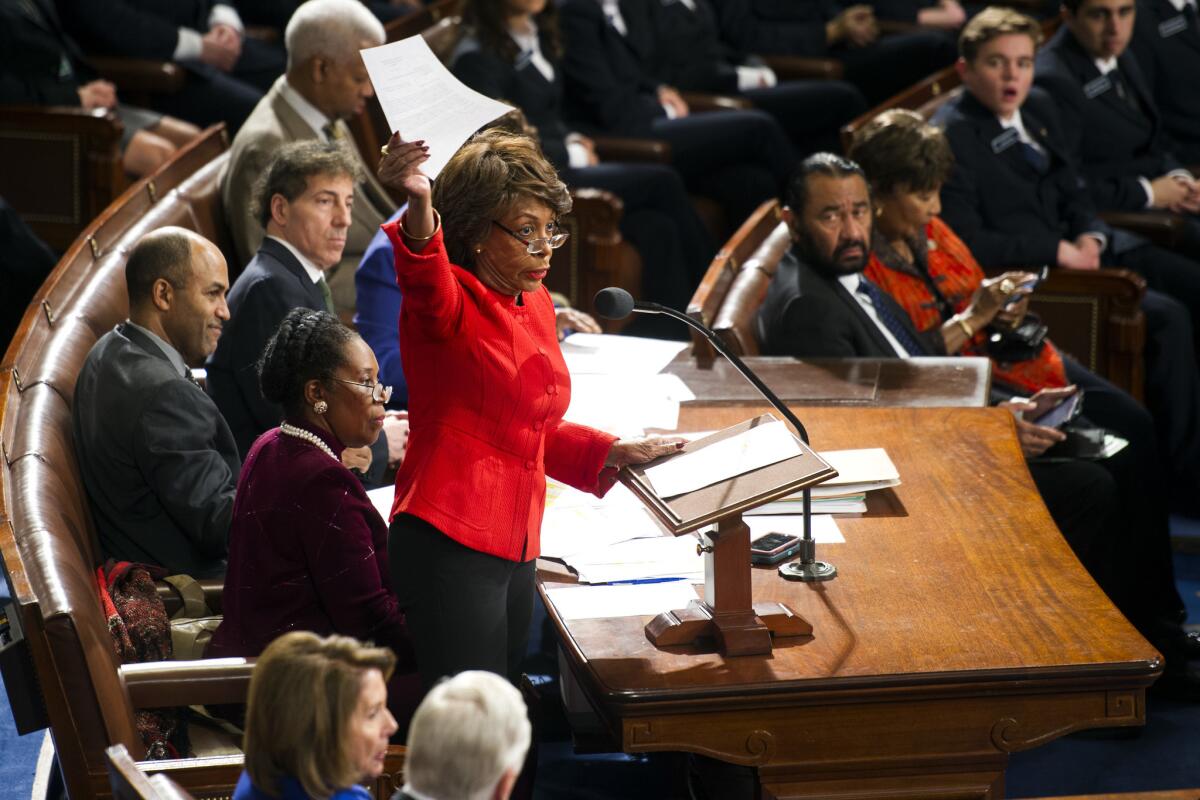Opinion: Republicans are overreacting to Maxine Waters’ Chauvin comments

Rep. Maxine Waters should have watched her words when commenting about the murder trial of former Minneapolis police officer Derek Chauvin. But in denouncing Waters for her remarks, House Republicans are engaging in selective and silly indignation.
Over the weekend the Los Angeles Democrat said that if Chauvin weren’t found guilty in the death of George Floyd, “then we know that we’ve got to not only stay in the street, but we’ve got to fight for justice.” She added: “We’ve got to get more active. We’ve got to get more confrontational. You’ve got to make sure that they know that we mean business.”
On Monday, Judge Peter Cahill said that Waters’ comments might be grounds for an appeal if Chauvin is convicted.
“I wish elected officials would stop talking about this case especially in a manner that is disrespectful to the rule of law and to the judicial branch and our function,” Cahill added.
Republicans, to use a Washington journalism cliché, pounced. Or you might say that they decided to “cancel” Waters (who was a favorite target of former President Trump).
House Minority Leader Kevin McCarthy (R-Bakersfield) accused Waters of “inciting violence in Minneapolis — just as she has incited it in the past.” (Republicans have blasted Waters for remarks she made in June 2018, when she called on the public to gather and “push back on” Trump administration officials wherever they went in public, and “tell them they’re not welcome anymore, anywhere” because of the administration’s practice of separating families at the southern border.) He later tweeted that he would introduce a censure resolution against Waters.
Waters and her defenders insist that she wasn’t inciting violence with her comments. Speaker Nancy Pelosi (D-San Francisco) said that “Maxine talked about confrontation in the manner of the civil rights movement.” Waters herself told CNN: “The whole civil rights movement is confrontation.”
It’s also a fact that — to the consternation of foreign observers — there is a tradition in America of commenting on a criminal trial while it is in progress. Journalists do it, politicians do it and so do activists.
Still, Waters should have been more careful, given widespread fears that an acquittal for Chauvin would prompt not only peaceful demonstrations but perhaps violence as well.
But it’s a stretch to say she was inciting violence. Some might regard references to “confrontational” conduct and “we mean business” as code for a call to lawless action, but the nonviolent interpretation is far more plausible.
More to the point, the American legal system has developed ways to ensure that jurors aren’t unduly influenced by outside comments. Cahill himself said: “A congresswoman’s opinion really doesn’t matter a whole lot.”
It’s rich for McCarthy to be so censorious about Walters’ comments. This is the Republican leader who, after saying that former President Trump bore some responsibility for the Jan. 6 siege of the Capitol by a “Stop the Steal” mob, later seemed to soften his criticism. McCarthy also made a pilgrimage to the former president’s residence at Mar-a-Lago to ask Trump to help House Republicans regain the majority.
McCarthy also declined to strip the far more incendiary Rep. Marjorie Taylor Greene (R-Ga.) of her committee assignments, though he did criticize some of Greene’s statements. (The full House voted to keep Greene off committees, over the opposition of McCarthy and most other House Republicans.)
The Chauvin trial and the larger issue of police violence against African Americans is serious business. Hyperventilating about Waters’ comments is politics at its silliest.
More to Read
A cure for the common opinion
Get thought-provoking perspectives with our weekly newsletter.
You may occasionally receive promotional content from the Los Angeles Times.







